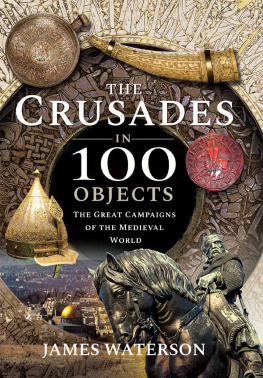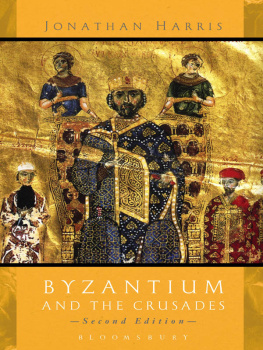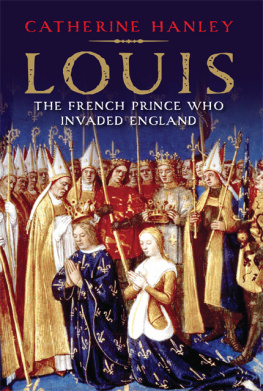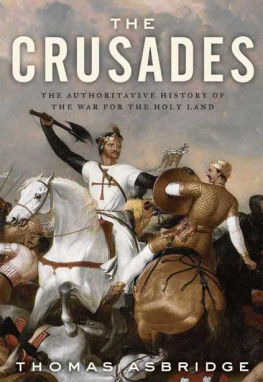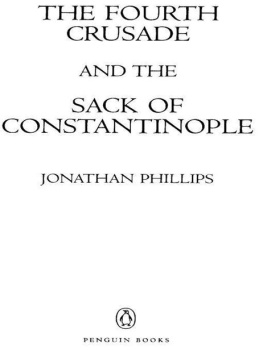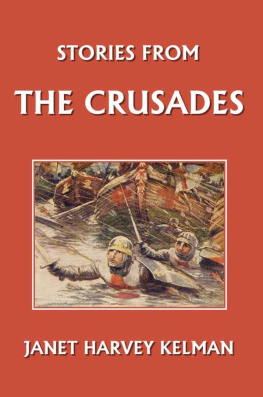
CHRONICLES OF THE CRUSADES
JEAN DE JOINVILLE was born between 1224 and 1225, the second son of a nobleman of Champagne. Many of his family had gone on crusades and he grew up in their shadow. Because of a series of deaths he became Lord of Joinville in his early teens, although his mother administered the estates for him. Jean probably first saw Louis, the man who was to have so much effect on him, at Saumur in 1241, although he did not get to know him until he was on crusade. Following family tradition he took the cross in 1248 and went on the Seventh Crusade. He wrote his Life of Saint Louis in old age, as a tribute to a king and also a portrait of a loved friend.
GEOFFROY DE VILLEHARDOUIN was probably born between 1150 and 1154. His father was a nobleman of Champagne with estates in the southern part of the province. Geoffroy was not the eldest son but, because of his family and marriage connections, he became Marshal of Champagne in 1185 an appointment which gave him experience in arbitration before he went abroad. He compiled his history of the Fourth Crusade a few years after the close of the expedition and wrote from first-hand knowledge. As Marshal of Romania he also had access to documents. Villehardouin probably remained in Romania till the end of his life: his chronicle ends abruptly at 1207 but there is evidence that he lived until about June 1218.
MARGARET SHAW was born in 1890 and took a B.A. degree by correspondence course from London University before going up to St Hughs College, Oxford, to gain a first in languages. She was at the Sorbonne when the First World War broke out, and returned to teach in Bradford, but she later went back to Paris and spent a long time there. She did research on Laurence Sterne, and published a book about his Letter to Eliza. She became a tutor at St Hughs, and taught in Repton in the Second World War. She translated two other books, Stendhals The Charterhouse of Parma and Scarlet and Black for the Penguin Classics, and had begun on another when she died in 1963.
JOINVILLE
&
VILLEHARDOUIN

CHRONICLES OF THE
CRUSADES
TRANSLATED WITH AN INTRODUCTION
BY M. R. B. SHAW
PENGUIN BOOKS
PENGUIN BOOKS
Published by the Penguin Group
Penguin Books Ltd, 80 Strand, London WC2R 0RL, England
Penguin Putnam Inc., 375 Hudson Street, New York, New York 10014, USA
Penguin Books Australia Ltd, 250 Camberwell Road, Camberwell, Victoria 3124, Australia
Penguin Books Canada Ltd, 10 Alcorn Avenue, Toronto, Ontario, Canada M4V 3B2
Penguin Books India (P) Ltd, 11 Community Centre, Panchsheel Park, New Delhi 110 017, India
Penguin Books (NZ) Ltd, Cnr Rosedale and Airborne Roads, Albany, Auckland, New Zealand
Penguin Books (South Africa) (Pty) Ltd, 24 Sturdee Avenue, Rosebank 2196, South Africa
Penguin Books Ltd, Registered Offices: 80 Strand, London WC2R 0RL, England
www.penguin.com
This translation first published 1963
35
Copyright The Estate of M. R. B. Shaw, 1963
All rights reserved
Except in the United States of America, this book is sold subject to the condition that it shall not, by way of trade or otherwise, be lent, re-sold, hired out, or otherwise circulated without the publishers prior consent in any form of binding or cover other than that in which it is published and without a similar condition including this condition being imposed on the subsequent purchaser
EISBN: 9780141904863
Contents
Introduction
FEW events in history have been more coloured by romantic imagination than that series of expeditions to the Holy Land known as the Crusades. The very name conjures up a vision of gallant knights inspired by pure religious zeal, leaving home and country to embark on a just and holy war against the enemies of the Christian faith. The two chronicles here presented, each composed by a man who took part in such an expedition, give a truer picture of an enterprise in which the darker as well as the brighter side of human nature is shown in the actions of those who took the cross. However, since these chronicles deal with only two of the Crusades, it is well perhaps in this introduction to place them in their context as giving part of a struggle between Christians and Moslems for possession of the Holy Land that lasted for nearly two hundred years.
Jerusalem, the Holy City, had been a centre of pilgrimage from very early times. Its capture in 638 by the Moslem Caliph Omar had left the Christians free to practise their religion. Conditions remained the same until 1076, when Jerusalem passed into the hands of the Seljukian Turks, who desecrated the holy places, and brutally treated the Christians in the city, throwing some into prison and massacring others. Pilgrims who managed to make their way to the Holy Land brought back pitiful tales of the plight of their co-religionists in the East.
The idea of a Holy War to avenge these wrongs occurred to Pope Gregory VII, and to his successor Victor III; but the peoples of Western Christendom, preoccupied with their own affairs at home, paid small attention to their pleas. However, little by little, to the north of the Alps, the preaching of Peter the Hermit did much to influence popular opinion in favour of a war against the infidel, and when, at the Council of Clermont in November 1095, Pope Urban II, a Frenchman born, appealed to his countrymen to join an international expedition to recover Jerusalem, he met with an enthusiastic response. In 1096 two expeditions started for the East. One, led by Peter the Hermit, consisted of an undisciplined mob, which was almost completely wiped out by the Turks in October of that year. The other, made up of properly organized troops in command of barons from Northern France and Flanders, Provence, and Southern Italy, arrived at Constantinople in December. Here they joined forces with the Byzantine Emperor. Passing through Asia Minor, where they helped the Greeks to capture Nicaea and defeated the Turks at Dorylaeum, they finally entered Syria. The people of the northern province of Edessa, in revolt against their Armenian ruler, invited Baudouin de Bouillon to take his place in March 1098. In June of that year the Crusaders captured Antioch; in July 1099 they took Jerusalem after a siege of only six weeks. This victory, one regrets to say, was followed by a merciless slaughter of Turks and Jews within the city. As a result of this first Crusade three Christian states were established in Syria: the principalities of Edessa and Antioch, and the kingdom of Jerusalem. The whole of this conquered territory was commonly known as Outremer (the land oversea).
For many years the barons of Outremer, by maintaining an offensive and defensive war against the surrounding enemy, managed to keep hold of the land they had gained without calling in aid from the West. In 1144, however, when the Turks overran the province of Edessa, the Queen-regent of Jerusalem, fearing lest, with Antioch now exposed on its northern border, the Turks might capture this province also, sent an urgent appeal to Pope Eugenius III to initiate a new Crusade. The Pope referred the matter to King Louis VII of France, a man of noted piety, who took the cross in 1146 at the Assembly of Vzelay, where Saint Bernards eloquence moved many Frenchmen to follow their kings example. Travelling to Germany, the saint persuaded the Emperor Conrad to join the expedition. In 1147 an army led by the rulers of France and Germany set off on the Second Crusade, determined to do great things. In the end, however, instead of advancing on Edessa, the Crusaders made an unsuccessful attempt to capture Damascus, and returned home without accomplishing anything.
Next page


